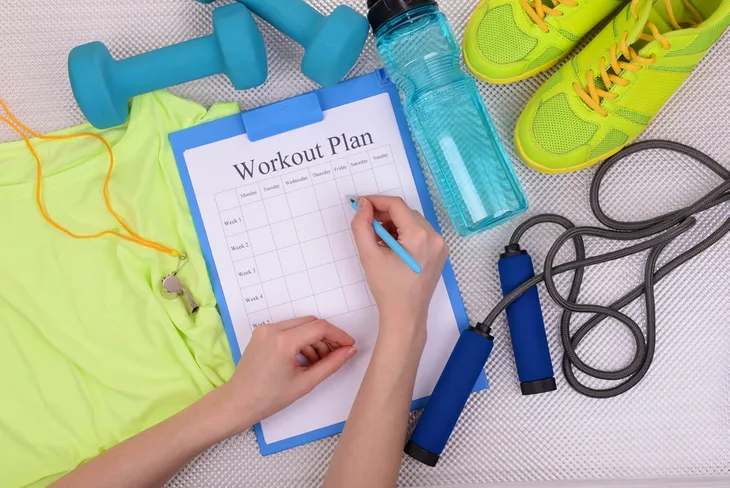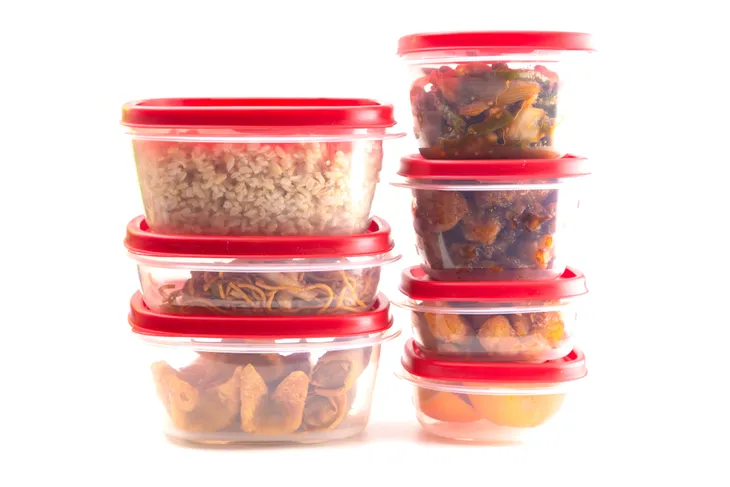Losing weight is difficult but keeping it off can be even more challenging. If you’ve ever gained weight after losing it, stepping on a scale can fill you with dread every time. The happiness you feel when you’ve reached your weight loss goal can be completely erased and replaced with frustration, confusion and sadness when you gain it back.
You’re not alone—whether your metabolism is out of whack, you have a difficult time following a healthy diet or getting regular exercise, or your medication causes weight gain, a lot of people struggle with maintaining a healthy weight. Luckily, there are effective ways to lose weight and keep it off.
While no one trick will work for everyone, these 10 tips for weight loss that lasts should help you stay at the size you worked hard for…
Exercise Regularly and Mix It Up
Exercise is a key component to losing weight and keeping those extra pounds off. Yet many people struggle to lose more weight from their current form of exercise, even when they’re exercising regularly. The fact is, following the same fitness routine is not the best or most effective way to lose weight and keep it off. Why? While you will lose a certain amount of weight and may be able to maintain that weight for a while, doing the same exercise every day doesn’t provide you with as many benefits as you could if you frequently changed up your routine or tried something completely new. Simply put, you’ll work and strengthen more muscles when you add variety.
It’s also common for people to get bored of their routine, causing them to skip out on getting to the gym or working out at home. This is especially common in the winter, when your mood is affected by the cooler or downright cold temperatures, and the days are shorter. To prevent this from happening, sign up for a new class or start training for a race before you get bored.
Say No
There’s nothing worse than the guilt trip and subsequent face-stuffing after someone makes something “just for you”. These treats are usually cookies, pies and cakes – things you probably avoid in most cases if you’re following a diet and making healthy food choices. And it’s always a bit funny (or annoying) when someone bakes for you but refuses to have any themselves. These food-pushers can be hard to deal with because you don’t want to seem rude or unappreciative.
While the thought and effort is nice, it can really knock some people off their healthy habits. For those who have worked hard to lose weight and struggle to keep it off, the offered treats are a temptation you’d rather not face regularly. Almost everyone has a hard time saying no, which means you might often give in and indulge beyond what you’d like to. The best thing to do is say no and explain that while you appreciate it, you’re focusing on eating healthy. This will also hopefully prevent the person from doing it again. Indulge in a piece of cake if you want but let others who want it take it home.
Get Family and Friends On Board
A step beyond mastering the art of saying no is to get everyone you spend time with on board with your healthy lifestyle – make sure they understand and respect your healthy habits. The people you surround yourself with can both help and harm your goals to be healthy. Share your goals and tell them how you’re going to meet them. A network of support can be a great motivator, but it can also help ensure you aren’t regularly tempted to break your new habits.
If you have a family, involve them in your strategy attain weight loss that lasts by planning activities that get you active. In the cold winter, bundle up and go for a hike or spend the day on the slopes. For days at the beach, bring a volleyball or football instead of just lying in the sun. In large groups like family or friend gatherings, organize a friendly (or competitive, depending on the group) game of your favorite sport.
Weigh Yourself Regularly
You might have to try different frequencies of weighing yourself to find what’s most effective, but you’ll eventually find the right amount that will keep you focused on maintaining your weight. Start with stepping on the scale every week or two, and see how it makes you feel. Weighing yourself regularly can help motivate you to eat well and exercise, since you’ll have your scale to answer to.
It’s important to note that several factors will cause your weight to fluctuate, depending on your diet, gender, what time of day you weigh yourself, and your activity level. It’s quite common for women to fluctuate in weight by a few pounds each day, so don’t freak out and let it bring you down. If you’re consistently gaining weight back, start weight yourself every day or every other day, and consider your eating and exercise habits to help identify what might be causing the weight gain. After looking over your habits and you’re unable to find the cause, consult your doctor because there are several medical conditions and medications that can cause weight gain.
Find a Health Buddy
One of the easiest ways to keep off weight is if you have someone around you who has similar goals. This person could be a friend or family member, or someone you met at an exercise class. Regardless of who they are, there’s nothing quite like the support and understanding from someone who is going through the same thing. This type of relationship can bring the much-needed motivation and encouragement of sticking to your healthy lifestyle. Just make sure they have a positive mindset as someone who complains and has a general negative vibe will be a barrier to your efforts.
A health buddy can help in a variety of ways, beyond mental and emotional support. The social aspect gives you something to look forward to after a long day at work or during times of stress. Your partner can also give you the confidence you need to try something new. It could be as simple as signing up for a new class you didn’t want to do alone, or more hardcore as training for a race.
Keep Focused Once You’ve Hit Your Goal
One of the easiest and quickest ways to gain back weight you’ve lost is to stop doing the things that helped you achieve your weight loss goal in the first place. It shouldn’t be surprising that you’ll gain back weight when you stop eating well and exercising. Your body loses fat and weight best through a healthy diet, strengthening and toning your muscles, and regular cardiovascular exercise. If these healthy habits are stopped, the weight can come back…and fast!
Another situation that causes weight to come back after a significant loss is from crash dieting. Tons of people do crash diets to drop weight quickly, only to be frustrated when they gain it back soon after. This also happens frequently with diets that cut out food groups. You begin eating what you cut out and voila, the pounds and inches are back. Instead of crash dieting, follow a healthy meal plan and exercise regularly to ensure the weight loss lasts. And if you cut out a food group, don’t bother if you plan to start eating it again soon after.
Live a Balanced, Healthy Lifestyle
A lot of people work towards their weight loss goal by doing only one of two things–eating well or exercising. Doing just one of these could help you lose weight, and you might even hit your goal, but the best way for weight loss to last is by living a balanced, healthy lifestyle that includes a combination of eating healthy and exercising regularly.
Eating foods that are low in bad fat, sugar, and sodium could help you drop weight quickly if your current diet includes unhealthy foods or bad eating habits. But you’ll hit a point where you won’t lose any more weight from healthy eating alone. Lack of exercise can greatly increase your risk for serious diseases and complications, so make sure you eat well and exercise for the most health benefits and to keep the weight off. On the other side, exercising but continuing to eat unhealthy foods might help you lose weight but the dangers of eating food that aren’t good for you will still remain–people who are super fit or thin are still at risk of developing health problems from an unhealthy diet.
Get Help When Needed
Everybody is different, therefore how you achieve your weight loss goals and maintain your ideal weight is going to be different than how others do it. Several factors contribute to whether or not you succeed, so if you’re struggling or don’t know where to start, don’t be afraid to get help. There are a lot of resources available online that can help you create a healthy meal plan and inform you about different types of exercises, as well as how much exercise you should be getting.
When researching these resources isn’t enough, consult a professional. Good gyms have knowledgeable staff who can offer tips and suggestions for achieving your goal, and weight loss that lasts. A lot of gyms also have personal trainers who could create an exercise and eating plan tailored to your needs and abilities. Sometimes people need professionals to help keep the weight off and continue on a healthy path once your goals are met. So don’t be shy and reach out for help when needed. The payoff will be worth it.
Write It down
There are three things you should keep track of by writing it down or entering it electronically on one of your many devices: your goals, what you eat, and your exercise. Writing things down often helps people lose weight and keep it off because it forces you to consider what you eat and how often you exercise, reminds you of your goals, and ultimately could prevent you from deviating from your healthy habits. At the beginning of your weight loss attempts, set goals for yourself. It’s best to set small goals so the bigger, overall goal doesn’t intimidate you.
It’s easy to convince yourself you can’t reach something when it seems too far out of reach, which is why setting small goals along the way is more effective. Goals keep you motivated and there’s an unmistakable burst of happiness and satisfaction each time you hit one. In the same booklet or device that you track your goals in, track your daily meals in detail and list the exercise you do each day. Eventually you won’t need to track everything because healthy habits will become second nature, but it’s a good place to start.
Skip Out On Leftovers
During holidays, birthdays, vacations, anniversary parties, and work parties, it’s oh-so tempting to put your hand up when asked if anyone wants leftovers. But odds are, whatever food that’s up for grabs probably isn’t the healthiest and it’s unlikely you’ll actually eat the leftovers as a full meal. Instead, you’ll start snacking on it right away when you aren’t really hungry or eat a second dinner right before bed time–neither of which are good habits to get into.
Situations that result in leftovers often include desserts, processed foods (especially at work events) and hearty, buttery comfort food like you find at Thanksgiving dinner. Everyone has the right, and should, treat themselves once in a while, but it’s difficult enough already to eat in moderation during these times. Unless the leftovers are fairly healthy and you have an iron will that will prevent you from going overboard or snacking uncontrollably, skip them. This will also help you savor and anticipate the next event that will have these delicious but unhealthy foods.













